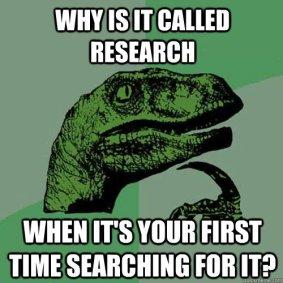This post is everything that you need to know for warming up your research engine and do your “first step”. If is time to warm up the research engine:
- You have a supervisor and you discussed with him/her a possible topic for your thesis.
- You already browsed a few scientific articles related to the topic and you like the subject.
 Warming up the research Engine
Warming up the research Engine
If that is not the case please look at How to take the most from your thesis and How to read a scientific article quickly and efficiently that will give you the basics for understanding what kind of thesis you would like to do and how to not spend an infinite amount of time reading scientific articles.
With all been said is now the time to understand what you have “your assets” and how you can start using them towards a successful thesis.
Count Your Assets
If you are thinking that you really have nothing, well think again. You have more than you can imagine. I am pretty sure that you can count on the following:
- A supervisor that is happy to mentor you and support you.
- Access to the facility at the university for reading scientific papers.
- Support for English writing via some university facilities.
- Guidelines on how to do a thesis from the thesis coordinator of your bachelor/master program.
- Examples of “good past thesis”.
- Knowledge of everything you have studied so far.
- Friend and family that will be happy to support you.
That is far from been nothing! On top of what I just listed you may also have:
- An Internship in a company.
- A part-time job in a company.
- Or no internship or job.
- Continuing the work of a previous student.
 Warming up your research engine: count your assets
Warming up your research engine: count your assets
The first set of items are clearly “assets” that you can use for helping you in doing your thesis. The second set represents things that are both an asset and a liability at the same time. An internship or a work in a company can provide you access to information that are normally not available to “outsiders”; however, at the same time, it subtract you precious time that you could dedicate to your thesis. Please do not misunderstand me, I do not believe that an internship or a part-time job at a company is “a bad thing”: it really depends on what you would like to do when you will graduate and if you want to know more please consider reading this article on How to take the most from your thesis before warming up your research engine.
Start your master or bachelor #thesis by #CountingOn #yourself and your #Assets !
Click To Tweet
Count how much time you have
Now that you know on what you can count during your journey towards a great thesis you should get a real and tangible grasp of the time that you have. In counting you should also consider that during this journey you want to spend time with your friends and have fun. This is as important as doing the thesis itself, as you do not want to burn out during the process but, hopefully, you would like to enjoy the process!
Start by working backward from the deadline.
In other words do the following:
- Figure out the deadline for submitting the thesis,
- Count vacation periods and time that you plan to take off,
- Count time that you have to spend in your internship as time that you will not dedicate to your thesis,
- Count the time that you have to spend in doing the remaining exams (if any).
- Do not forget to consider time for gym and/or beers!
If you do the math you will have an idea of an upper bandwidth of the time that you could dedicate to your thesis. Critically assess that number and ask yourself “Is this doable or you are overestimating/underestimating yourself?” If you are experiencing difficulties you may involve your supervisor in this discussion as he/she has more experience then you in this matter. However, if that is your decision start thinking at possible scenarios before having that discussion. You will have a set of solutions and gather valuable feedback instead of “sharing your problem” to you supervisor.
When #planning your #thesis , #measure your #time carefully: start by counting it #backwards
Click To Tweet
Build a fuzzy but feasible timeline
Now that you have a clear understanding on how much time you can/want to dedicate to your thesis you can start envisioning a possible timeline. As is impossible to predict the future you can expect that you will deviate from your planned deadline. That is why is important that you have a flexible (fuzzy) goal-driven and action-oriented timetable. In defining the milestones for your timetable you can consider that the thesis can be divided in the following sub-tasks:
- Understand the problem: this can be done both, via an extensive literature review, or using your internship or expertise of your supervisor.
- Acquiring the basic knowledge of the subject: once that you know what is the topic of your thesis you want to supplement your current education with a one or two books about the topic in order to gather the big picture on which problem that you are trying to solve.
- Extensive Literature Review: you want to survey and understand the cutting edge research that is perform around the topic in order to become an expert of the sub-domain in which your thesis is part.
- Formulate a scientific hypothesis and related model: the more you will be analyzing the literature and spending your time in solving the challenge from a practical point of view at your internship the more you will start be able to formulate a scientific hypothesis that you can “cast some light” into the problem.
- Building an experiment that validate/invalidate your hypothesis: use the data or use cases that you define to validate your theories from a qualitative or quantitative point of view.
- Write the thesis: you should consider the task of writing a thesis as a an independent task. Being able to presents the finding of your work in a simple and understandable manner has its challenges and require time and effort.
There is a clear dependency among these tasks and the more you will advance in one the more you will feel the need to update and revisit what you have already done in the others. That is perfectly normal, and is the reason why you want to consider a “fuzzy” schedule: the more you will advance in building the thesis the more you will become expert in the material and the more you will see things clearly.
You may want to discuss with your supervisor all the aspects of your thesis and put a time duration on each task together with “your next first step” that is covered in the following subsection.
your #thesis need a fuzzy #schedule when you will set your #deadline . Have clear #goals and a #flexible #Mindset on how to #reachinggoals
Click To Tweet
Think about your next step
 Everything start with your first step
Everything start with your first step
If you reached this step you have a list of assets that you can use for building your thesis, a clear and feasible timeline and a set of related tasks. The only item that you are missing for warming up your research engine is “your first next step”. Every great journey start taking that first step. Your thesis is not an exception in this respect.
Figure out where you are in the journey of your thesis and what you could do for advancing it forward. Do it and book an appointment with your supervisor for discussing what will come next!
This is pretty much all you need to know for warming up your research engine!
Have a clear objective and try to be flexible in reaching it. After all, you are doing research and this activity has a serendipity component.
What are the first steps when starting your #thesis ?
Click To Tweet
This article ( warming up your research engine ) is part of the miniseries on how to do a good thesis, you can see the full list of post at the following links:
How to Do a Good Thesis: the Miniseries
If you like what you read, consider sharing it!
